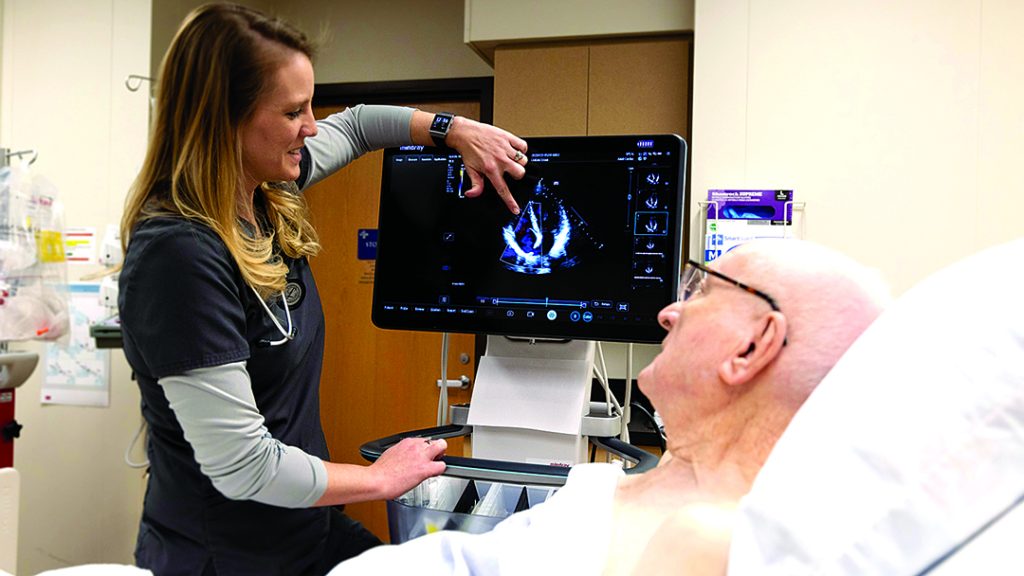Helmsley Trust grants $459,000 to help GRHS purchase state-of-the-art ultrasound equipment
News | Published on March 27, 2023 at 2:48pm CDT

The Leona M. and Harry B. Helmsley Charitable Trust has granted $459,547 to Glacial Ridge Health System to purchase five ultrasound machines as part of a $26.4 million ultrasound initiative in Minnesota, it was announced last week.
The initiative includes nearly $18.3 million to help Minnesota hospitals and health centers purchase ultrasound imaging devices and an additional $8.1 million to boost sonography and point-of-care ultrasound (POCUS) training opportunities across the state.
Nate Tiedeman, a Nurse Practitioner at Glacial Ridge Hospital’s Emergency Department (ED) in Glenwood, shared his excitement. “I feel extremely blessed to work at a rural facility with truly state-of-the-art ultrasound equipment. All of our full-time ED providers were trained on the new Mindray TE X. We continue to work and train closely with ultrasound specialists to enhance and refine our skills for bedside ultrasound,” Tiedeman said. “The stethoscope is out; the ultrasound is now the standard of care. In conjunction with Hennepin County Medical Center (HCMC), all full-time ED providers at Glacial Ridge have been trained to perform resuscitative transesophageal echocardiograms (TEE). Glacial Ridge and HCMC are the only two EDs in Minnesota with this capability. There are only a handful nationwide.”
Ultrasound uses high-frequency sound waves to produce images of structures inside the body. This safe, cost-effective tool supports other clinical information to help providers make timely diagnoses and provide appropriate treatment. Tiedeman said, “Here at Glacial Ridge, we are working every day to keep our patients’ care close to home and exceeding the standards of care.” He added, “Thank you to Glacial Ridge Hospital and Helmsley Charitable Trust for the wonderful opportunities so we can provide the absolute best care possible throughout our hospital.”
Walter Panzirer, a Trustee for the Helmsley Charitable Trust, said the grants will help improve access to exceptional medical treatment for all Minnesotans, whether they live in the heart of Minneapolis or a smaller rural or underserved community.
“Our hospitals and health centers need to stay current with rapidly advancing technology so they can continue to provide top-notch healthcare close to home,” Panzirer said. “These grants help ensure that facilities across Minnesota have the latest and greatest ultrasound equipment and training.”
The grants were announced last Tuesday during a news conference at Hennepin Healthcare in Minneapolis.
More than half of the 196 devices purchased through the grants (109) are POCUS machines, which are used by providers at the bed or tableside for immediate assessment of a patient to quickly determine a course of action. The grants will also provide 69 general ultrasound systems and 18 cardiovascular ultrasound systems, which aid in imaging of the heart.
The initiative also includes more than $8.1 million to train new sonographers, offer continuing education to sonographers and ultrasound technologists, and provide comprehensive POCUS training to doctors, physician assistants, and nurse practitioners. The training grants include more than $917,000 to the Minnesota Rural Health Association to support sonographer training in rural and underserved areas of the state, more than $1 million to the Minnesota State Colleges and Universities to expand St. Cloud Technical & Community College’s sonography program, and nearly $6.2 million to the Minnesota Academy of Family Physicians Foundation which will partner with High Quality Medical Education (HQMEDED) to provide POCUS training across the state.
“These grants are a game changer for rural hospitals across the state,” said Thomas Pahl, PA-C, an emergency department clinician at Glacial Ridge Health System, instructor with HQMEDED and member of the Minnesota State Trauma Advisory Council. “Clinicians and sonographers will not only have access to the newest ultrasound equipment on the market, but they will also be able to pursue educational opportunities to become more proficient at use of the equipment, expand the studies they can perform, and incorporate these skills into their clinical practices.”
The Leona M. and Harry B. Helmsley Charitable Trust aspires to improve lives by supporting exceptional efforts in the U.S. and around the world in health and select place-based initiatives. Since beginning active grantmaking in 2008, Helmsley has committed more than $3.5 billion for a wide range of charitable purposes. Helmsley’s Rural Healthcare Program funds innovative projects that use information technologies to connect rural patients to emergency medical care, bring the latest medical therapies to patients in remote areas, and provide state-of-the-art training for rural hospitals and EMS personnel. For more information, visit www.helmsleytrust.org.




